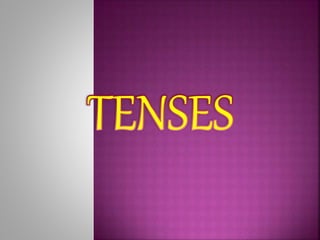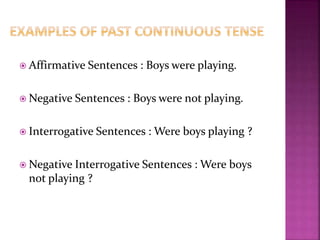Tenses lesson no 1
- 2. Made by : Samreen Shabbir TGT FG Public School No. 1 (Girls), Bahawalpur.
- 3. Tenses are the form taken by a verb to show the time of an action or the state of an event. ï There are three tenses : 1. The Present Tense 2. The Past Tense 3. The Future Tense.
- 4. ï Each of the three tenses has four forms or sub- divisions to show continuity or completeness of the action and time. These are : 1. Indefinite 2. Continuous or Imperfect 3. Perfect 4. Perfect Continuous
- 5. o The Indefinite Tense does not indicate whether the action is complete or not. o The Continuous (Imperfect) Tense that the action is still going on. o The Perfect Tense indicates that the action is complete , finished or perfect. o The Perfect Continuous Tense indicates that the action began in the past and is still continuing.
- 6. Subject + Verb1 + Object Expresses a general truth or an action that is occurring now Eg : The sun rises from the east. Expresses an action that occurs regularly or habitually Eg : She goes to the school regularly.
- 7. ï Affirmative Sentences : They play. ï Negative Sentences : They do not play. ï Interrogative Sentences : Do they play ? ï Negative Interrogative Sentences : Do they not play ?
- 8. Subject + H.V.(Is/Am/Are) + V1 + ing + Object. E.g. I am teaching the class The present continuous tense is used to express an action which is happening at a particular time in the present or extending over a period of present time.
- 9. ï Affirmative Sentences : You are playing. ï Negative Sentences : You are not playing. ï Interrogative Sentences : Are you playing ? ï Negative Interrogative Sentences : Are you not playing ?
- 10. ï Subject + has/have + V3 + Object. ï Has Singular , Have Plural. e.g. She has done her homework ï The present perfect tense denotes an action that was started in the past and has just been completed.
- 11. ï Affirmative Sentences : I have played. ï Negative Sentences : I have not played. ï Interrogative Sentences : Have I played ? ï Negative Interrogative Sentences : Have I not played ?
- 12. ï Subject + has/have + been + V1 + ing + Object e.g. They have been studying since morning ï The present perfect tense is used when an action that started in the past is still continuing.
- 13. ï Affirmative Sentences : We have been playing. ï Negative Sentences : We have not been playing. ï Interrogative Sentences : Have we been playing ? ï Negative Interrogative Sentences : Have we not been playing ?
- 14. ï Subject + V2 + Object. e.g. Rabia called her friend ï The simple past tense is used for an action which happened at a particular time in the past.
- 15. ï Affirmative Sentences : I played. ï Negative Sentences : I did not play. ï Interrogative Sentences : Did I play ? ï Negative Interrogative Sentences : Did I not play ?
- 16. ï Subject + was/were + V1 + ing + Object. e.g. children were playing in the park ï The past continuous tense is used for an action which was happening at a particular time in the past.
- 17. ï Affirmative Sentences : Boys were playing. ï Negative Sentences : Boys were not playing. ï Interrogative Sentences : Were boys playing ? ï Negative Interrogative Sentences : Were boys not playing ?
- 18. ï Subject + had + V3 + Object. e.g. She had done her task. ï The past perfect tense is used to express an action that was completed before another action started in the past. It is used with the earlier of the two actions. The simple past tense is used with the other action.
- 19. ï Affirmative Sentences : Shumila had played. ï Negative Sentences : Shumila had not played. ï Interrogative Sentences : Had Shumila played? ï Negative Interrogative Sentences : Had Shumila not played ?
- 20. ï Subject + had + been + V1 + Object. e.g. Girls had been talking for many hours. ï The past perfect continuous tense is used for an action that began before a certain point in the past and continued up to that point.
- 21. ï Affirmative Sentences : Ria had been playing. ï Negative Sentences : Ria had not been playing. ï Interrogative Sentences : Had Ria been playing? ï Negative Interrogative Sentences : Had Ria not been playing ?
- 22. ï Subject + will/shall + V1 + Object. e.g. Ayesha will go to the market ï The simple future tense is used for an action that will take place at particular time in the future.
- 23. ï Affirmative Sentences : Raza will play. ï Negative Sentences : Raza will not play. ï Interrogative Sentences : Will Raza play ? ï Negative Interrogative Sentences : Will Raza not play ?
- 24. ï Subject + will/shall + be +V1 + ing + Object e.g. She will be washing the clothes ï The future continuous tense is used to express an action which will be in progress at a particular time in the future.
- 25. ï Affirmative sentences : I will be playing. ï Negative sentences : I will not be playing. ï Interrogative sentences : Shall I be playing? ï Negative Interrogative Sentences : Shall I not be playing?
- 26. ï Subject + shall/will + have + V3 + Object. e.g. Students will have learnt their lesson ï Future perfect tense is used to indicate the completion of an action by a certain period of time in the future.
- 27. ï Affirmative Sentences : She will have played. ï Negative Sentences : She will not have played. ï Interrogative Sentences : Will she have played? ï Negative Interrogative Sentences : Will she not have played?
- 28. ï Subject + shall/will +have been + V1 + ing + Object. e.g. She will have been singing the song since 2;o clock ï The future perfect tense is used when an action is to continue up to a certain point of time in the future.
- 29. ï Affirmative Sentences : Rizwan will have been playing. ï Negative Sentences : Rizwan will not have been playing. ï Interrogative Sentences : Will Rizwan have been playing ? ï Negative Interrogative Sentences : Will Rizwan not have been playing ?
- 30. Tense Indefinite H.V. + verb Continuous H.V. + verb Perfect H.V. + verb Perfect Continuous H.V. + verb Present Play (s) Is / Am / Are Playing Has / Have Played Has / Have been Playing Past Played Was / Were Playing Had Played Had been Playing Future Will / Shall Play Will / Shall be Playing Will / Shall Have Played Will / Shall have been Playing Table Of Tenses
- 31. Present Present Indefinite tense Present Continuous tense Present Perfect tense Present Perfect Continuous tense Affirmative Sentences I play I am playing I have played I have been playing for two hours Negative Sentences I do not play I am not playing I have not played I have not been playing for two hours Interrogative Sentences Do I play? Am I playing? Have I played? Have I been playing for two hours? Negative Interrogative Sentences Do I not play? Am I not playing? Have I not played? Have I not been playing for two hours?
- 32. Make Affirmative, Negative, Interrogative and Negative Interrogative sentences of 2nd persons (singular and plural) and 3rd persons (singular and plural) in present tense by your own.
- 33. Past Past Indefinite tense Past Continuous tense Past Perfect tense Past Perfect Continuous tense Affirmative Sentences I played I was playing I had played I had been playing for two hours Negative Sentences I did not play I was not playing I had not played I had not been playing for two hours Interrogative Sentences Did I play? Was I playing? Had I played? Had I been playing for two hours? Negative Interrogative Sentences Did I not play? was I not playing? Had I not played? Had I not been playing for two hours?
- 34. Make Affirmative, Negative, Interrogative and Negative Interrogative sentences of 2nd persons (singular and plural) and 3rd persons (singular and plural) in past tense by your own.
- 35. Future Future Indefinite tense Future Continuous tense Future Perfect tense Future Perfect Continuous tense Affirmative Sentences I shall play I shall be playing I shall have played I shall have been playing for two hours Negative Sentences I shall not play I shall not be playing I shall not have played I shall not have been playing for two hours Interrogative Sentences Shall I play? Shall I be playing? Shall I have played? Shall I have been playing for two hours? Negative Interrogative Sentences Shall I not play? Shall I not be playing? Shall I not have played? Shall I not have been playing for two hours?
- 36. Make Affirmative, Negative, Interrogative and Negative Interrogative sentences of 2nd persons (singular and plural) and 3rd persons (singular and plural) in future tense by your own.





































